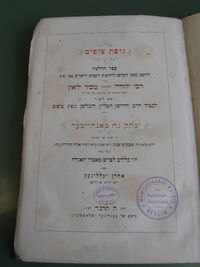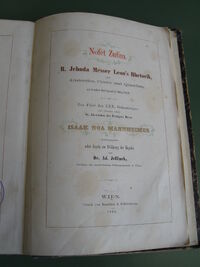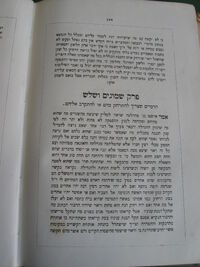יהודה מסר ליאון או יהודה בן יחיאל רופא (1420 או 1425 - 1498) היה רב, מורה, רופא[ ופילוסוף באנקונה שבאיטליה. במסגרת עבודתו הוא הִטְמִיעַ וגִּלֵּם את הגישה האִינְטֶלֶקְטוּאָלִית של אוניברסיטאות איטליה באותה עת מבלי שהזניח את המורשת התרבותית של היהדות כפי שבאה לידי ביטוי במונח "חכם כולל", איש אשכולות מונח מקביל ל"איש הרנסנס", המשלב בהצלחה לימודים כלליים עם לימודים רבניים. אידאל זה הוא השתדל להנחיל לתלמידיו.
תולדות חייו[]
מניחים כי יהודה מסר ליאון נולד בסביבות שנת 1420 ב"מונטוואקיו מג'יורה" (Montecchio Maggiore) היום בנפת ויצ'נצה שבמחוז ונטו. הוא היה בן של רופא. הוא קבל סמיכת לרבנות וכן דיפלומה ברפואה. לפי הידוע פרידריך השלישי, קיסר האימפריה הרומית הקדושה העניק לו את התואר "מסר", תואר של אבירות בשנת 1452. כנראה הודות לתרומתו הרפואית.
יהודה מסר ליאון כיהן ברבנות אנקונה, בה הקים ישיבה, אשר כללה בתוכנית שלה לימודי קודש ולימודי חול מהסוג שנלמד בתוכנית לימודים בימי הביניים. תוכנית לימודים שהוא גיבש היה לה המשך במשך ארבע מאות השנים הבאות. פעילותו הרפואית אשר זכתה להצלחה הביאה לו תהילה רבה.
בין השנים 1456-1472 הוא התגורר בפדובה ובבולוניה, היכן שלמד לימודים נוספים באוניברסאות הערים האלו. בשנת 1469 הוא קבל תואר דוקטור מאוניברסיטת פדואה. לאחר שהות קצרה בונציה היכן נולד בנו "דוד בן יהודה מסר ליאון" נולד, בשנת 1473 הוא נבחר לכהן ברבנות מנטובה. בעקבות קונפליקט הוא נאלץ להגלות מן העיר בשנת 1475.
בשנת 1490 הוא התיישב בנפולי, בחסות שליט העיר, פרדינד הראשון מנפולי (Ferdinand I of Naples). בשארית חייו הוא התגורר בעיר, יחד עם הישיבה המיוחדת שלו. ממסמך של בנו, משנת 1499, הסתבר כי הוא, בנו, נאלץ לברוח מהעיר בשל פרוגרום שבוצע בעיר ואל אביו הוא מתיחס כנפטר. הערה: יש השערה כי הוא נפטר במקדוניה ולא בנפולי.
נופת צופים[]
הוא נודע בשל חיבורו על אומנות הנאום העברי "נופת צוף". הספר שעניינו חכמת השירה והמליצה מבחינה דידקטית - תחום שאינו רחוק מבלשנות - אינו ידוע אלא לקומץ ביבליוגרפים ואנשי מקצוע, ושוב לא נדפס אלא לאחר כארבע מאות שנה, כאשר הדירו מחדש אהרן ילינק בפעם שניה ואחרונה. הספר יצא במהדורות אחדות: בשנת 1863, וינה תרכ"ב, דפוס צילום ירושלים תשל"א והוצאת מאגנס בשיתוף עם בית הספרים הלאומי.
דפים נבחרים מהספר - צולמו בבית הספרים הלאומי
Works[]
Messer Leon wrote extensively, including commentaries on the Logic, the Ethics, and the Physics of Aristotle, and their analysis by Averroes, in which he followed the Scholastic style and methods, composing for his students "summaries (sefequot) on the Scholastic quaestiones (i.e. points of apparent textual contradiction) debated by the Italian academic community",[1] drawing closely on the style and substance of expositions then current at Padua.
These commentaries were written primarily for his close followers. More generally circulated were three textbooks addressing the three foundation subjects of a Renaissance secular education, the trivium ("three ways") of grammar, logic and rhetoric, seen as the essential prerequisite disciplines necessary for higher studies in the humanities, philosophy, and medicine. These subjects he covered with a Hebrew grammar under the title Libnat ha-Sappir (The Pavement of Sapphire) in 1454, a text-book on logic entitled Miklal Yofi (Perfection of Beauty) in 1455, and, most celebrated, a text-book of rhetoric called Nofet Zufim (The Honeycomb's Flow), which was printed by Abraham Conat of Mantua in 1475-6, the only work by a living author printed in Hebrew in the fifteenth century.
Like non-Jewish contemporary texts, the Nofet Zufim drew heavily on the classical theoretical writings of Cicero and Quintilian. But unlike its contemporaries, it took as its exemplars for such theories not the foremost orators of Greek and Roman antiquity, but Moses and the leading figures of the Hebrew Bible. In the opinion of Deutsch,[2] the object of the work was both apologetic and propagandic. The author desired to demonstrate to the non-Jewish world that the Jews were not devoid of the literary sense, and he wished to prove to his co-religionists that Judaism is not hostile to secular studies, which contribute to a better appreciation of Jewish literature. Although in later centuries the book was largely forgotten, and was not reprinted until the nineteenth century, in the intellectual circle of its own time it was highly appreciated. Azariah dei Rossi quoted Leon as a witness to the value of secular studies,[3] and Joseph Solomon Delmedigo recommended the book to the Karaite Zerah ben Nathan of Troki.[4] In recent times interest has been renewed, with a new scholarly edition with translation and commentary published in 1983.
Descendants[]
Following on from his father, Messer Leon's son, David ben Judah Messer Leon also became a noted rabbi, physician and author, and defender of the value of the secular disciplines of the Renaissance to Jewish philosophy culture and study. David became best known for his Ein ha-Kore (Eye of the Reader), a sympathetic commentary on Maimonides' Guide for the Perplexed; and posthumously for his Tehillah le-Dawid (Glory to David), an encyclopedic summary of Jewish philosophy, edited by his grandson Aaron ben Judah (Constantinople, 1577).
לקריאה נוספת[]
- אברהם מלמד, 'רטוריקה ופילוסופיה בספר "נופת צופים" לר' יהודה מסיר ליאון' איטליה, א (תשל"ט), חוברת ב, עמ' ז-לח;
הערות שוליים[]
קישורים חיצוניים[]
- נופת צופים] - בית הספרים הלאומי
References[]
- Judah Messer Leon, The Book of the Honeycomb's Flow, Sepher Nopheth Suphim. Edited and Translated by Isaac Rabinowitz. Cornell: University Press, 1983 ISBN 0801408709
- Judah Messer Leon, Nofet Zufim, On Hebrew Rhetoric, facsimile edition of the 1475 printing, with an introduction (in Hebrew) by Robert Bonfil. Jerusalem: Magnes Press, 1981.
- Hava Tirosh-Rothschild, Between Worlds: The Life and Thought of Rabbi David ben Judah Messer Leon, pp. 25–33. State University of New York Press, 1991. ISBN 0791404471
- Daniel H. Frank and Oliver Leaman (eds.), History of Jewish Philosophy, pp. 514-515. London: Routledge, 1997. ISBN 0415080649
- Colette Sirat, A History of Jewish Philosophy in the Middle Ages, pp. 403-4. Cambridge University Press, 1990. ISBN 0521397278
- Mauro Zonta, Hebrew Scholasticism in the Fifteenth Century: A History And Source Book, ch. 4, Springer, 2006. ISBN 1402037155.
- Isaac Husik, Judah Messer Leon's Commentary on the "Vetus Logica", Leiden: Bril, 1906
- Rabbi David ben Judah Messer Leon (Judah Messer Leon's son). Notes of the Norbert Normand Lecture for 5756.
[{{{1}}} יהודה מסר לאון], במהדורת 1901–1906 של Jewish Encyclopedia (באנגלית)




